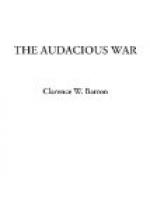In the present war stress and with economy practised to-day more by the capitalist classes than the laboring classes, the amount of money for reinvestment should be far greater than this.
English finance will cut its cloth according to the pattern. If there is only $2,000,000,000 per annum of surplus earnings to put into the war, that money will be spent; and if England has 50 or 100 per cent more, that money likewise will be spent, but spent so judiciously that the largest possible sum from it is kept in channels of English trade. The British Empire will work and finance the fight thus within a circle, and right on its own base.
The surprising thing is that it can be called upon to extend financial help to its allies. But everybody except Germany was caught absolutely unprepared. The war was early on French soil, tying up the resources of some of the richest provinces of France. Russia had so little thought of war that, as I have previously explained, she had deposited from her great gold reserve so that it had been loaned out on time and therefore was not available for the start of the war. Hence we have the spectacle of Russia gathering up 8,000,000 pounds sterling in gold and sending it to the Bank of England and, on this basis, borrowing of the Bank 20,000,000 pounds sterling.
Of course, this is good banking and good business and a good alliance. The Allies are bunching their war orders and credits, and England is entitled to hold the bag since she is carrying the financial burden.
England’s war finance is not wholly measured in her expenses or loans to other countries. In a single issue of a London paper you can count daily reports of more than a dozen charitable funds connected with the war-work. These funds range all the way from “Aid to the Mine-Sweepers,” “Gloves for the Soldiers,” and the “Servian Relief and Montenegrin Red Cross Funds” up to the “Prince of Wales’s Fund.”
This last was over $20,000,000 before Christmas. The suddenness of this war may be illustrated by this fact: A friend of mine, who is managing director of a big English concern, has assumed the responsibility for seven years past of keeping in England one year’s supply of everything that his company was likely to require from the Continent. This was at a cost to his company of many thousands of dollars. With dogged determination he stuck to the same policy for 1914, although in January of that year it was clear to him that Germany could not afford to go to war. While he was happy over his judgment, he admitted in conversation with me in December, 1914, that in January, 1914, the outlook was less indicative of a general European war than it had been for many years.
Thirty per cent of the workmen of his factory had gone to the war and his company was providing 250,000 pounds sterling a year to maintain the wages of the workmen at war up to the same amount as they would receive if they had stayed at home. He said that in one of his offices, of 80 men eligible for the work, 78 had enlisted, and, what was wonderful, the women were glad to take up the heavy work abandoned by the men,—something they would have refused to do in all ordinary times. On the whole, the output of this concern and its efficiency were materially increased, not diminished, by the war.




